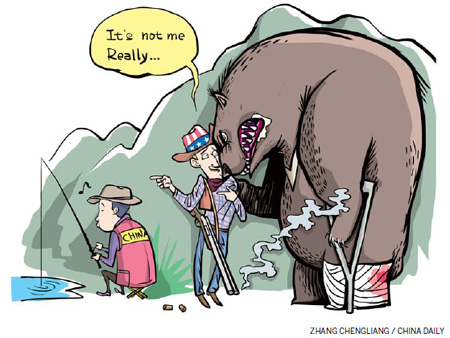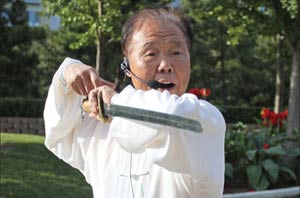China shapes up as scapegoat for US ills
Updated: 2011-10-14 08:45
By Giles Chance (China Daily)
|
|||||||||

The United Statets is down. This mighty and proud country, shocked and wounded by the historic impact of the Sept 11 terrorist attacks in New York 10 years ago, has been weakened further by two inconclusive wars in central Asia, and brought to its knees by the worst economic recession in its history which has left more than 9 million unemployed.
Two weeks ago, two focus groups of US women who had shopped at Walmart within the previous month were brought together by the opinion polling organization Public Opinion Strategies and asked about how they saw the US today. One group, in their 40s and 50s, was from Des Moines, Iowa; the other, in their 20s and 30s was from Orlando, Florida. Each group consisted of 10 women. In Orlando, the women were asked to describe, in a word or two, how things were going. The responses: "depressing", "different", "discouraging", "sour" and "bad".
"Any positive words to describe America now?" asked the interviewer. Silence followed.
How did they see the US economic troubles in their lives? One woman replied that her company posted a job vacancy two weeks ago. Two hundred and fifty people applied, "all overqualified". Another said all the houses in her neighbourhood were for sale, or had been repossessed by a bank.
Another said, "If I had the financial stability, I think I'd leave." One woman's husband left her, so she took her children to live with her parents. Then first her father lost his job, and after that her brother-in-law.
All the women described how they were saving money, by shopping in bulk, not going on holiday, not going out to restaurants, and switching between credit cards. Is this worse than 2008, when the recession started? Oh yes, they said.
What is their greatest fear? "Not being able to buy presents for Christmas," said one. "Losing my job," said another. "My elderly parents are spending all their savings," said a third. Who's to blame? The banks, they said, because it was the banks that persuaded everyone it was OK to borrow.
How is President Obama? "Indifferent"; "lukewarm"; "great speaker"; "he's tried and failed". Both groups expressed strong feelings about Congress. One comment was: "They're playing a game." Another was: "They've wasted a lot of time." What did the women want in a political leader? "Someone who cares more about America than he does about himself."
What should the government do? "Fix the problem." What sort of leader should America have? "Someone who isn't hollow."
All the women, in both groups, said they would be standing in line to vote at the next presidential election, in 2012, when President Obama's four-year term comes to an end. All said they were pleased that Sarah Palin, the former Republican Governor of Alaska who transfixed the nation as the possible vice-president in the last election in 2008, was not putting herself up as a presidential candidate in 2012.
The US is down. But it is not out. That's the message I have received since I arrived in early September as a visiting professor at the Tuck business school at Dartmouth College in New Hampshire. Across the country, ordinary men and women are beginning to cross traditional barriers of party, color and class, to come together and express a desire for an end to party politics. There's a new convergence of thought among serious Americans, cutting across party lines, that the US economy is more important than any other issue, and it has to be fixed.
Everyone now agrees that the US government is bankrupt, that social spending has to be cut and that the country's finances have to be placed on a solid footing. The only people who probably don't understand this new unity and seriousness among the voting population are US politicians. There is a danger that when the US votes next year, both the Democratic and the Republican parties will be shocked by the strength of the US people's demand for solid cross-party solutions to the country's persistent economic weakness.
What could these solutions be? Obama has been widely criticized in the US for using up much of his political capital early on in his presidential term on "Obamacare", an attempt to make wasteful and expensive healthcare more efficient and to bring it within the reach of the lowest-paid and unemployed. The consequence of "Obamacare", combined with the country's economic circumstances, makes it likely that the next US president will be elected in about one year's time with a powerful mandate to reduce the government deficit by cutting spending.
Cuts to a wide range of US social welfare programs are a foregone conclusion. As for tax increases, so far, Republicans have strongly opposed them. But the worsening public mood will not support the Republicans' anti-tax dogma much longer. After the next election, the US will probably see higher taxes on income, and on discretionary spending. In the search for large budget savings, even the massive defense spending of the US armed services is now being considered as fair game by many from all parts of the political spectrum. This suggests a final end to foreign adventures in Iraq, Afghanistan, and anywhere else in the "Axis of Evil" that the Republican right-wing had lined-up in its sights a couple of years ago.
From a Chinese perspective, a new US focus on budget cuts and financial solvency would seem to be good, given that much of China's savings are invested in US public debt. In other ways, though, the new US determination to put its economic house in order may not be such good news for China. This week, a bill labelling China as a "currency manipulator" was passed by a large majority in the Senate. For the bill to become law, it has to pass in the House of Representatives and receive the president's signature. Both events seem unlikely in the near-term. Many members of Congress, conscious of the votes they will need in a year's time to hold onto their seats, support their local businesses in opposing the bill, while Obama has indicated that he will exercise his right of veto, and refuse to pass the bill into law.
But what will happen if Obama is succeeded next year by a Republican president brought to office on a strong tide of pro-American, anti-foreign sentiment? Already it's clear to a visiting observer like me that American feelings toward China are increasingly being governed by skepticism, even fear and mistrust. An article in a recent issue of the The Wall Street Journal, titled "China's lure has dark side", describes the rising costs of labor and other imports which are driving down the operating margins and profits in China of US fast-food chains Kentucky Fried Chicken and Pizza Hut.
Americans have been deeply wounded by the loss of US power and prestige which followed the 2008 financial collapse and the subsequent deep economic recession. A basic US mistrust of China held mainly outside US business community, inflamed by rising economic tensions, makes it likely that Sino-US relations will be a casualty of a renewed US determination to right the ship.
China should prepare itself for a new US administration in 2012, elected to "put America right", to turn on China as the scapegoat for US economic ills. Import duties of 10 percent or higher on certain Chinese products entering the US have already been called for by an eminent US economist. If the anti-Chinese currency legislation becomes law, then US protectionism, and worse, will follow, with negative consequences for Sino-US relations, and for Chinese and world economic growth. Things could get much worse.
The author is visiting professor at the Guanghua School of Business, Peking University. The opinions expressed in the article do not necessarily reflect those of China Daily.
(China Daily 10/14/2011 page8)









